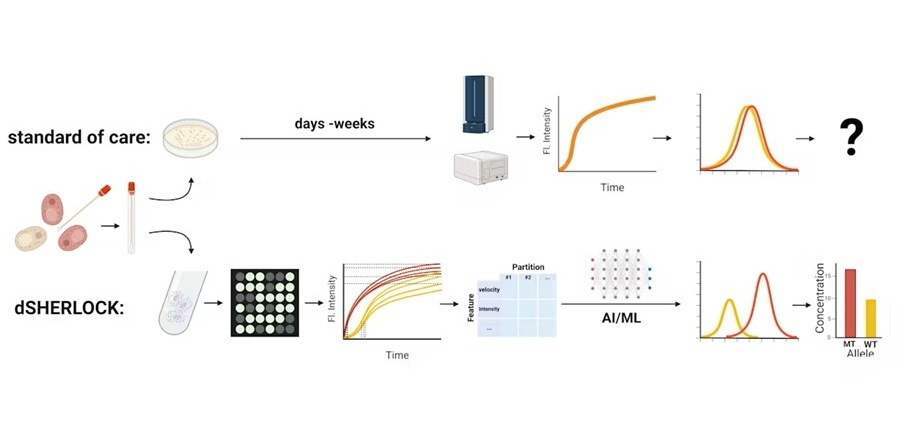Rapid Test Diagnoses Tropical Disease within Hours for Faster Antibiotics Treatment
Posted on 14 Mar 2024
Melioidosis, a neglected tropical disease, is believed to affect around 165,000 individuals globally each year, with approximately 89,000 succumbing to it. This illness is caused by the bacterium Burkholderia pseudomallei, which thrives in the soil and water of tropical and subtropical areas, gaining entry into humans through skin cuts, consumption, or inhalation. Diagnosing melioidosis poses challenges due to its varying symptoms ranging from localized infections and pneumonia to severe septicemia or prolonged chronic conditions. The disease's tendency to predominantly affect isolated rural communities contributes to its significant underreporting. Diagnosis traditionally depends on culturing bacterial specimens, a process extending over three to four days. Meanwhile, a large percentage of patients with melioidosis succumb to the disease, often within the initial 24 to 48 hours of hospital admission, while waiting for a diagnosis. Although no vaccine exists for melioidosis, it can be effectively managed with specific intravenous antibiotics if identified promptly. However, the current diagnostic delay leads to the initial administration of broad-spectrum antibiotics, unnecessarily extending treatment times and resource usage.
An international collaboration that included researchers from the Wellcome Sanger Institute (Cambridgeshire, UK) has led to the development of a rapid diagnostic test capable of identifying melioidosis within hours, significantly quicker than traditional methods. This advancement allows for the faster administration of appropriate antibiotics. Utilizing CRISPR technology, this new test identifies a Burkholderia pseudomallei-specific genetic marker with 93% sensitivity, offering a promise of higher survival rates through a rapid, globally applicable diagnostic solution. Developing this test involved the analysis of over 3,000 B. pseudomallei genomes, predominantly sequenced at the Sanger Institute, to identify a unique genetic target.
.jpg)
The designed test, CRISPR-BP34, enhances the DNA of the target bacterium through a recombinase polymerase amplification reaction, with a subsequent CRISPR reaction ensuring specificity. The presence of melioidosis is confirmed by a simple lateral flow 'dipstick' method. To validate this test, the team examined clinical samples from 114 melioidosis patients and 216 non-affected individuals from northeast Thailand, a melioidosis hotspot. The CRISPR-BP34 test demonstrated a 93% sensitivity rate, surpassing the 66.7% sensitivity of conventional bacterial culture techniques, and delivered results within four hours for urine, pus, and sputum samples, and within a day for blood samples, markedly faster than the current methods. This new rapid diagnostic test not only promises quicker diagnosis and treatment for melioidosis patients but also aims to conserve medical resources and reduce hospital stays by preventing the indiscriminate use of broad-spectrum antibiotics. The team is planning randomized clinical trials to further validate the test's effectiveness in hospitals and is exploring the influence of human genetics on melioidosis susceptibility and immune response.
“This research is a testament to international collaboration and how the application of genomics at scale leads to clinical intervention,” said Professor Nick Thomson, Head of Parasites and Microbes at the Wellcome Sanger Institute. “Using a genetic target mined from a bank of thousands of bacterial genomes, the team was able to produce an incredibly sensitive test that is specific to the bacterium behind melioidosis. I look forward to seeing the clinical impacts of this research.”
Related Links:
Wellcome Sanger Institute













